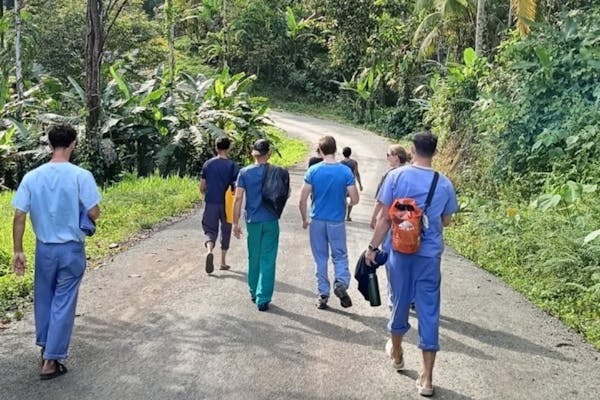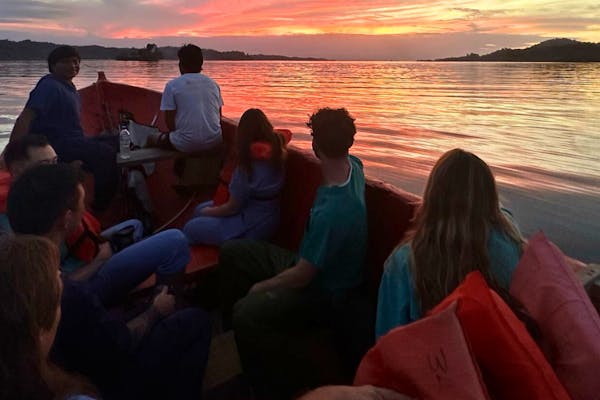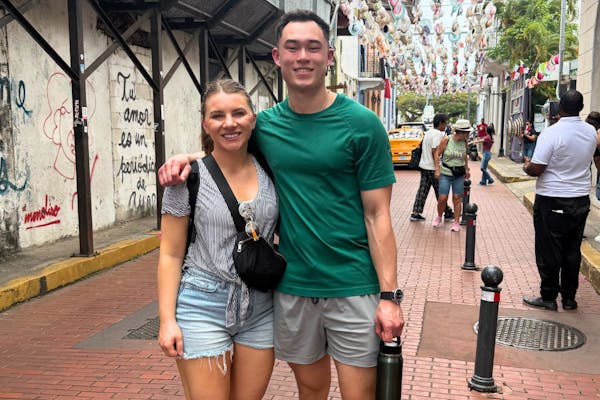From Minnesota to Panama: PA student gains global perspective through hands-on care
By Monique Kleinhuizen '08, GS'16, content specialist
August 22, 2025 | Noon
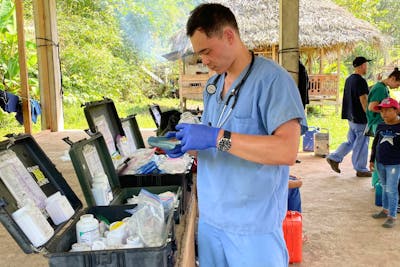
Nate Chau ’22, GS’25 has spent the last year completing clinical rotations as part of Bethel’s physician assistant (PA) program. It’s brought him to large and small communities where he’s served populations with very different needs and realities. In many ways, this variety is the point. Clinicals provide students the chance to build disparate skill sets in many different specialties and settings, but also to develop compassion and perception as they narrow down their career goals and prepare for meaningful work in a complex and growing field.
“It was great having such different clinical experiences—not only in different specialties, but also different locations—from super small town Minnesota to Regions Hospital in downtown St. Paul, a Level 1 trauma center,” Chau says, noting how the experiences were a fitting culmination of his time at Bethel.
Chau had had a full undergraduate experience on campus. He studied biokinetics, played football for the Royals, and desperately wanted to study abroad. He was inspired, in part, by his mom speaking highly of her own study abroad experience. “She always said, ‘if you get the chance, just do it. Because when else in your life can you live somewhere else, care-free, for a month?’” Chau says.
That chance never came. Many international programs went on hiatus during COVID-19, and Chau graduated without the global experience he’d hoped for. As he began his final clinical rotations in the PA program, he felt an even stronger pull toward an international placement—one that would stretch his adaptability and deepen his compassion.
When he learned about Floating Doctors, a nonprofit that brings medical teams to rural and remote Panamanian communities without easy access to medical care, the decision was easy. Soon he and classmate Kellie Schmidt ’22, GS’25 were bound for the Bocas Del Toro island province of Panama, ready to fill an elective requirement while stepping into a once-in-a-lifetime learning opportunity.
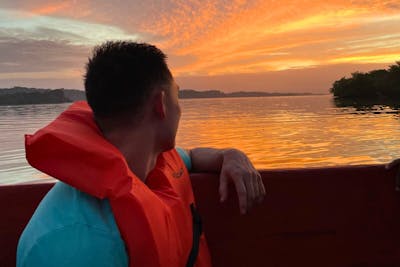
— Nate Chau
A different perspective
Floating Doctors deploys medical teams, called “mobile clinics,” by boat, packhorse, or on foot to remote corners of Panama. Many of the communities it serves live deep in jungle- and mangrove-covered areas that are riddled with rivers and mountains. For some, their teams are the only medical, dental, or veterinary service available.
For a month, Chau and Schmidt served on a team of short-term volunteers and medical residents providing care in remote communities during the week, with the weekends set aside for rest and sight-seeing. They’d arrive with a blood sugar machine, an ultrasound, hemoglobin and HIV tests, and basic medications, with long lines of patients waiting for them most days. Despite cultural and language barriers and limited physical resources, they were able to provide healing and hope.
“Getting a wide variety of clinical experience in the program was huge,” Chau says. “But then being able to do it in Panama? Honestly, it felt like a different career field entirely, in a way, just so unique and different.”
Compassionate care
Chau says the daily cases were most akin to family medicine, because they treated all ages and medical conditions. They did prenatal care—sometimes providing ultrasound images to women who’d never had them before—and saw frequent dermatology and ophthalmology cases. He treated someone with severe chickenpox (there’s no vaccine available locally) and a man with a severely broken finger. For those cases, the team did what they could to treat discomfort while referring the patients to a hospital using a special fund set aside to pay for rare referrals.
For the gentleman with the broken finger, Chau had to think through what another trip would mean. With the region’s rough roads, riding with a broken, swollen finger would be excruciating—and could take hours. So he utilized a local anesthetic to numb the finger long enough to get the patient to a larger city hospital.
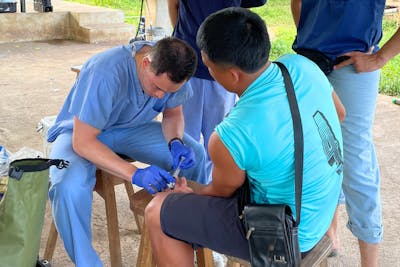
PA student Nate Chau treats a man's broken finger during a clinical rotation in Panama
“A setting like that teaches the importance of narrowing down diagnoses by just taking a history and physical exam and not relying on labs to show me what’s wrong or thinking, ‘I can just take a picture and figure out what’s going on.’ That’s not an option anymore,” Chau says. Seeing patients in open-air, pop-up clinics with bare-bones supplies was eye-opening, not because it was impeding good work, but because it showed him how little is needed to provide quality care in many cases.
“In America, we’re blessed to have access to advanced medical care, and even simple things like labs and medical imaging that help providers do good work,” he says. In the physician assistant program, he’d built experience in cutting-edge labs, making him comfortable with the equipment he’d see in a modern clinic or hospital. He knew the ins and outs of compound conditions and how someone’s mental health or lifestyle can impact their body and how they react to conditions or medications. He learned to take a trauma-informed approach to patient interactions, considering what might be going on behind-the-scenes, spiritually and emotionally. It all came into play in Panama, but in a stripped-down way. “We learned how to bring medical care back to the basics,” he says.
From early on, Chau had his sights set on becoming a physician assistant, and he was adamant on continuing at Bethel for it. In the 27-month PA program, students spend nearly half of their time in clinical rotations designed to give them intentional, hands-on experience in a variety of settings and specialties. While didactic—or in-classroom—learning is foundational, working side-by-side with other medical professionals, putting clinical knowledge to work, and building patient-facing skills is paramount to becoming a skilled provider. For Chau, the opportunity to complete a rotation abroad, while serving the local community there, was the icing on the cake of an incredible learning experience.
He thinks back to one moment during his time in Panama, when he and his team arrived by boat to an extremely remote community. The men of the community were waiting at the dock for them, with a hand-made sign that said “Welcome.” They had wheelbarrows ready to carry the team’s gear, eager to get them settled and underway. “Everywhere we went, there were lines. We felt very needed and really appreciated,” Chau says.
Loading Gallery...
What’s next?
Chau and his cohort graduated from the physician assistant program on August 9—where Chau was honored with the "4 Cs" award, given to students who exemplify Bethel's values—and take the Physician Assistant National Certifying Exam (PANCE) later this month. Historically, Bethel PA students have had a near-perfect pass rate on the exam. As he waits for results and for his professional credentialing to kick in, Chau is interviewing for full-time PA positions—mostly within emergency medicine, urgent care, and trauma settings—and taking some down-time to coach football.
— Nate Chau
As he looks back on his Bethel experience, from undergrad to the PA program and his time in Panama, he’s grateful for the balance he’s experienced, and the way it’s prepared him well—for life and his career.
“I truly believe there’s no other community like this, and it’s supported me as a person, holistically, and made me more well-rounded,” Chau says. “Some of the biggest decisions you'll ever make in your life have to do with your faith and who you marry—but then another one is where you go to college. Where you go to college has a big impact on those other two…at least it did for me. One of the best decisions I've made in my life was to come to Bethel. I’m grateful for it.”
Explore healthcare at Bethel
In the Anderson Family College of Health Sciences at Bethel University, you’ll get clinical experience, expert instruction, and a transformative community, equipping you with comprehensive skills and deep compassion to serve in healthcare. Whether you’re looking for cutting-edge undergraduate programs in exercise science, nursing, social work, and more—or want to explore our graduate-level physician assistant, counseling, or nurse-midwifery options, there’s something for you here.
